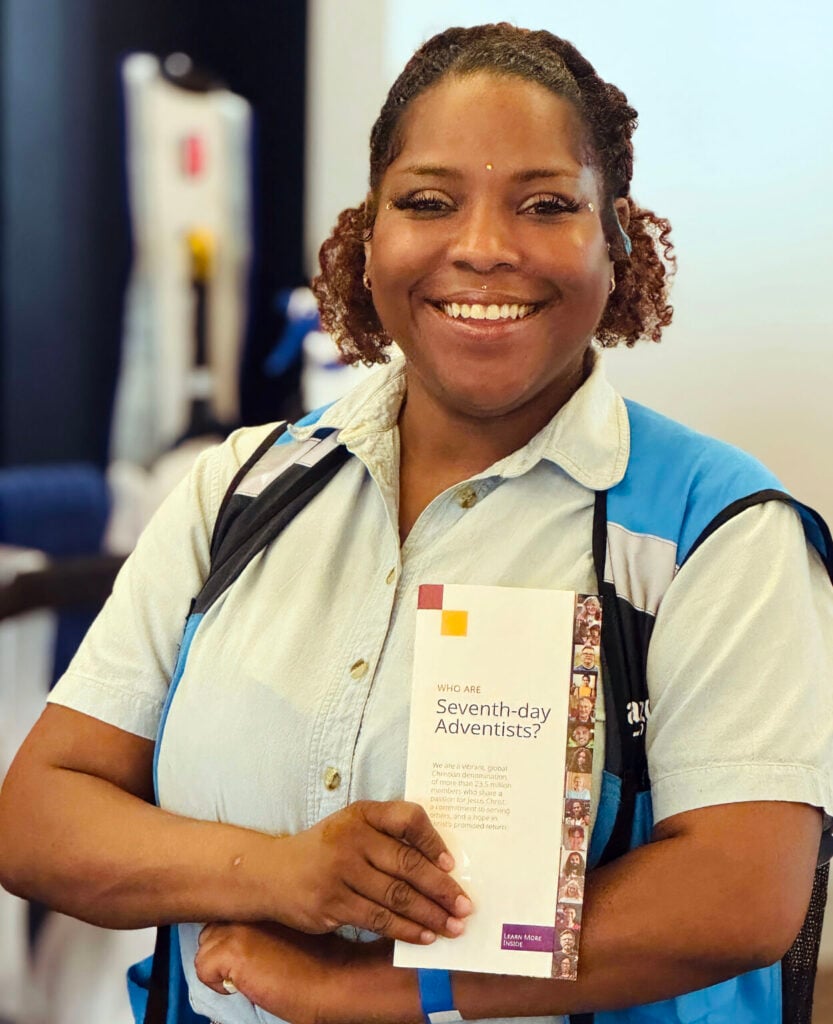Ministering would be wonderfully straightforward if all young people in the Seventh-day Adventist Church, between the ages of 18 and 35, regularly attended church and Sabbath school. The unfortunate reality for many Adventist young people is that they do not attend church and Sabbath school on a consistent basis.[i] The best data available suggests that approximately 72 percent of Adventists under 30 years of age participate in either Sabbath School or a small group Bible study. In our modern era, when we talk about Sabbath school for Seventh-day Adventist youth and young adults, we are really talking about Sabbath school for only 72 percent of them, more than one fourth of our young people are “unchurched” or “under-churched.”
Furthermore, the idea of a unified or systemic approach to young adult Sabbath school curriculum is currently not a reality. In the North American Division (NAD), no official Sabbath school curriculum has existed for decades for this demographic. In sum, too many Adventists young people are unsurprisingly foregoing the unplanned and under-resourced Sabbath school experience.
It’s difficult to find verifiable/corresponding estimates of how many young people leave the Seventh-day Adventist Church, but authorities on the subject indicate only three out of 10 remain in the church when they enter adulthood. [ii] Undoubtedly, there are a multitude of reasons why this retention rate is painfully low, but certainly, some of the explanation lies in the fact that there is no official and highly relevant Sabbath school curriculum in the NAD. The evidence suggests that the curricula that do exist, regardless of how relevant and impacting they potentially could be, are not reaching the intended audience.
The foundational impetus behind the NAD’s iBelieve Bible Study is to witness to young people not where we want them to be, which, of course, is in church and Sabbath School, but where they are, which is in the digital realm. The iBelieve Bible Study is an online curriculum designed to strengthen the faith of youth and young adults in and outside the Seventh-day Adventist Church. iBelieve Bible is made up of four main components that are released incrementally throughout the week including: short blog posts, short videos, social media interaction, and online Bible studies.
Only partially an event and community occasion like traditional Sabbath school and Bible studies, iBelieve Bible is a regular interjection of biblical themes and topics into the daily lives of people that culminates on Friday afternoons, leading up to and in preparation for the Sabbath. Utilizing social media, iBelieve Bible provides a sequentially strategic stream of information, resources, and questions that builds on itself throughout the week. It is the hope of the iBelieve Bible staff this inclusion of biblical topics and themes will not be distinct from the lives of young people, but rather a integral part of what they consume and interact with in their daily living, much of which is spent online.
Cyberspace Delivery System
iBelieve Bible takes the traditional learning objectives and faith strengthening principles found in Bible study curricula and delivers them throughout the week via social media. Following the NAD Education Bible standards for grades 9–12, iBelieve Bible is founded in biblical principles and the 28 Fundamental Beliefs. Topics and themes shared each week via social media are designed to show the relevance of the Seventh-day Adventist Church, Bible, and Jesus Christ in the lives of those who might be questioning their faith or have no faith at all. Examples of topics include: immigration, environmentalism, gender equality, fornication, salvation, drugs, and hypocrisy.
Some present-day critics may claim the Bible and its teachings only have relevance in agricultural or pre-industrial societies,[iii] but this isn’t the case. Although the issues modern youth deal with today obviously take different forms than they did 2,000 years ago, the Bible is still, beyond question or debate, relevant and useful to our modern lives. The packaging and delivery of how biblical truths are approached, however, does need to be carefully considered for modern audiences.[iv]
iBelieve Bible content on topics like fornication and narcotics is presented honestly and without being overly “sanitized.” Rather than avoiding difficult issues and questions simply because they may be offensive or viewed as potentially “dangerous,” iBelieve Bible instead approaches them as prospective learning moments or spiritually engaging opportunities. Instead of coddling our audience and viewing questioning by youth and young adults as troublesome or dangerous, iBelieve Bible sees it as opportunity. Young people are not blind to reality. They know drinking alcohol can be quite enjoyable, that smoking marijuana can be fun and has scientifically proven medical applications, and that the human body is designed for sex. The iBelieve Bible staff is committed to the notion that the all too commonplace aversion to eschew difficult issues and questions has led many young people astray. Young people ask questions, it’s what they do. As a community of believers, we can either decide to answer their difficult questions as best and imperfectly as we can, or as is sometimes the case, we can ignore and even chastise them for asking them in the first place.
Exploring Beliefs, Nurturing Souls
iBelieve Bible tries to create an online experience free of judgment about personal religious beliefs and life journeys, and nurtures an environment that lends itself to exploring important spiritual issues without overtly imposing all the answers. This means intentionally inviting spiritual questions and debate, and also cultivating relationships in the online arena.[v]
iBelieve Bible entertains thousands of social media interactions weekly, and although many of these posts are sometimes somewhat superfluous to our faith strengthening efforts, many are deeply meaningful exchanges with Adventists and non-Adventists. For example, Maxwell Aka, iBelieve Bible’s creative manager, was able to minister to a young man dying of cancer. The terminally ill young man reached out to Aka on Facebook and shared his challenges of increasing isolation from friends and family, severe financial struggles, and the stresses of dying. Aka was able to minister to the young man by sharing prayers and scriptures with him before he died. The Seventh-day Adventist Church was there for this young man when, as he indicated, his family and friends were not. It may have been more beneficial for Aka to be physically by this terminally ill young man’s side, but serving others takes many forms and, in this instance, ministry took the form of social media interaction.
Another meaningful exchange took place with Jonny Moor, iBelieve Bible’s social media pastor. Moor ministered to a young man willing to publicly identify himself as an atheist in the midst of Christians reinforcing their faith on a Facebook thread. Not only did Moor share the Gospel with this young atheist, but he was able to affirm him as an individual that was cared for and was welcomed to share his voice loud and clear amongst Christians.
Built by Young Adults for Young Adults
iBelieve Bible content is designed for young people and built by young people. Because iBelieve utilizes the talents and expertise of youth at all levels of production and delivery, the staff feel that the product has a much higher chance of being relevant to its intended audience. The world and its various cultures are evolving at a mindboggling pace that makes generational divides more acute and more prevalent.[vi] This is not to say that a 50-year old cannot effectively minister to a 20-year old, but rather that it is more difficult than in times past. Language, extracurricular interests, technical abilities, entertainment forms, and historical events all make it harder for generations to find common ground on which to build a relationship where intergenerational witnessing and mentorship can occur.
Even the forms of communication between generations are distinctive — Generation Z prefers to communicate through hand held devices and apps, Generation Y (Millennials) through text messaging and social media, Generation X through email and text messaging, and Babyboomers typically favor the telephone.[8] Witnessing online, to a significant extent, necessitates utilizing the efforts and talents of digital natives from your intended audience, because they understand the nuances of the culture and digital environment they are already operating (living) in.
Empowering youth to do youth ministry has two notable outcomes for the iBelieve Bible Study. First, it gets us closer to ensuring that our content is delivered using the jargon, tone, voice, culture, philosophy, and aesthetic expectations and norms of twenty-first-century young people in the NAD. Second, it helps us prepare another generation of leaders for service to our Lord. Too often we are guilty of “including” youth and young adults in ministry by relegating them to song service and potluck cleanup.[vii]
Asking young people their opinions in focus groups and studies, and then going out and building content based on their responses isn’t enough. In today’s world young people understand and navigate technology in ways older generations will never understand. If we fail to include them in the leadership of technology based ministerial initiatives, we will not only run the risk of producing something that misses the mark, but also of losing the leaders of today, not tomorrow. The iBelieve project is built upon content created by young adults for young adults. So it stands to reason that young adults would know best how they can be reached.
The social media approach to making iBelieve Bible content available and interactive anywhere and anytime helps eliminate the dichotomy of secular versus spiritual space and time. iBelieve Bible content can be used in regular social media posts of the Church and its followers, Adventist schools, home school devotions, family worship, personal worship, vespers, public high school evangelism, and of course, youth and young adult Sabbath school.
Interactive Sabbath Study
Sabbath school has traditionally been an event a person had to physically be present for, iBelieve Bible attempts to brings the same kinds of discussions and content a person would typically interact with in Sabbath school, and brings it to them wherever they might be. We also have begun using Facebook Live sessions as a way to engage our audience in the more typical “event” approach often favored by religious communities. The Facebook Live approach takes on a conversational tone with questions being asked by the audience and answered by our pastoral team. Although additional experience and research is needed in this area, this online real-time discussion format may prove another worthwhile approach to Sabbath School.
In the twenty-first century, people want to watch videos. Studies show that consumers of digital content are 4 times more likely to “watch a video about a product than read about it.” An astounding 25 percent of digital consumers “lose interest” in companies that don’t include video in their marketing. And, approximately 80 percent of people say videos about “a product or service…is important.”[viii] Reading text in our fast-paced and aesthetically demanding world is simply losing its appeal for many audiences. Because of this changing reality, iBelieve Bible staff attempts to produce at least one to two high quality videos per week. We also rework videos to be shorter and platform appropriate.
For example, on Twitter, shorter videos are marketed rather than longer ones, because people using Twitter interact with content differently than they do another platform like Facebook.
In early September 2016, the iBelieve Bible Study was launched, and since that time the initiative has seen significant compounding success. In February 2017, more than 1,004,441 people were reached on Facebook with over 165,000 people viewing videos — 90 percent of the people reached on Facebook are under 35 years old. iBelieve Bible reaches people both in and outside the Church, and has a regular domestic and international audience numbering in the hundreds of thousands.
A willingness to change and adapt is the nature of the online and especially social media worlds. Not being responsive means not being relevant. The old adage of “slow and steady” doesn’t apply well in the digital realm. It is our hope and prayer the Seventh-day Adventist Church in North America develops and adopts a Sabbath School curriculum for youth and young adults that can respond to their needs quickly and with efficacy. iBelieve Bible has demonstrated a market exists for spiritual topics online, and perhaps with more study and careful planning the Church can develop an official Sabbath School curriculum, informed by iBelieve Bible’s findings, that meets the needs of twenty-first century audiences.
— Adam Fenner, Ph.D., is the director of the North American Division’s Adventist Learning Community (ALC).
[i] Peter Cincala, Roger Dudley, and Monte Sahlin, Report “Survey of Teens and Young Adults,” May 2-14, Mega Study 1, North American Division of the Seventh-day Adventist Church, NAD Office of Strategic Planning, Research and Assessments by the Institute of Church Ministry at Andrews University: http://circle.adventist.org/files/icm/nadresearch/SurveyTeensYoungAdults.pdf.
[ii] Andrew McChesney, “Jiwan Moon Has a Plan to Retain Adventist Youth, Adventist Review, March 3, 2015: http://www.adventistreview.org/church-news/story2362-jiwan-moon-has-a-plan-to-retain-adventist-youth; and Joe Reeves, “The Paralyzing Segregation of Generations: Why Young and Old Need Each Other, The Compass Magazine, August 13, 2015: https://thecompassmagazine.com/blog/the-paralyzing-segregation-of-generations-why-young-and-old-need-each-other.
[iii] “13 Things the Bible Forbids Other than Homosexuality (That You’re Probably Guilty of Doing),” Huffington Post, February 2, 2016: http://www.huffingtonpost.com/2012/03/07/13-things-the-bible-forbids_n_1327701.html; and “Rob Bell Suggests Bible Not Relevant to Today’s Culture,” CBN News, February 19, 2015: http://www1.cbn.com/cbnnews/us/2015/February/Rob-Bell-Suggests-Bible-Not-Relevant-to-Todays-Culture.
[iv] Liz Kanoy, “Why You Don’t Need to Make the Bible Relevant,” Crosswalk.com, June 25, 2016: http://www.crosswalk.com/blogs/christian-trends/why-you-don-t-need-to-make-the-bible-relevant.html.
[v] Phrasing is partially adapted from an upcoming article by the author in The Journal of Adventist Education.
[vi] Brandon J. O’Brien, “Christ, Culture, and the Generation Gap,” Christian Bible Studies Transformed by the Truth, October 23, 2012.
[vii] For interesting reading on youth leadership see: https://youthministryconversations.com/how-do-you-see-the-church-engaging-youth-in-worship-services/.
[viii] Meagan O’Neill, “The 2015 Video Marketing Cheat Sheet [Infographic],” Animoto blog, May 7, 2015: https://animoto.com/blog/business/video-marketing-cheat-sheet-infographic/.




